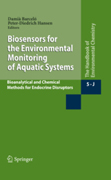
Biosensors for the environmental monitoring of aquatic systems bioanalytical and chemical methods for endocrine disrupto
Barceló, D.
There is an increasing need for effective methods of estimating the risks caused by the large number of pollutants released into the environment by human activities. This volume provides an overview of biosensors as a key tool for the environmental monitoring of aquatic systems. Biosensor technology is based on a specific biological recognition element in combination with a transducer for signal processing. In particular, the detection and identification of endocrine-disrupting compounds and other toxins in wastewater are treated in detail. Biosensors are presented as a practical alternative or supplement to traditional chromatographic techniques. Emphasis is also placed on the validation of the applied technology and its application to real-world environmental samples. INDICE: Biosensors for Environmental Monitoring at Global Scale and the EULevel. Achievements of the RIANA and AWACSS EU Projects: Immunosensors for the Determination of Pesticides, Endocrine Disrupting Chemicals and Pharmaceuticals. Biosensors for Pharmaceuticals and Emerging Contaminants Based on Novel Micro and Nanotechnology Approaches. Recombinant Yeast Assays and Gene Expression Assays for the Analysis of Endocrine Disruption. Biosensors for Aquatic Toxicology Evaluation. Genetically Engineered Bacteria for Genotoxicity Assessment. Adverse Effects in Aquatic Ecosystems: Genotoxicity as a Priority Measurement. Genotoxicity in the Environment (Eco-Genotoxicity). Liquid Chromatography-Mass Spectrometry Methods for Analysis of Endocrine-Disrupting Chemicals in Wastewaters. Index.
- ISBN: 978-3-540-00278-9
- Editorial: Springer
- Encuadernacion: Cartoné
- Páginas: 278
- Fecha Publicación: 01/01/2009
- Nº Volúmenes: 1
- Idioma: Inglés
